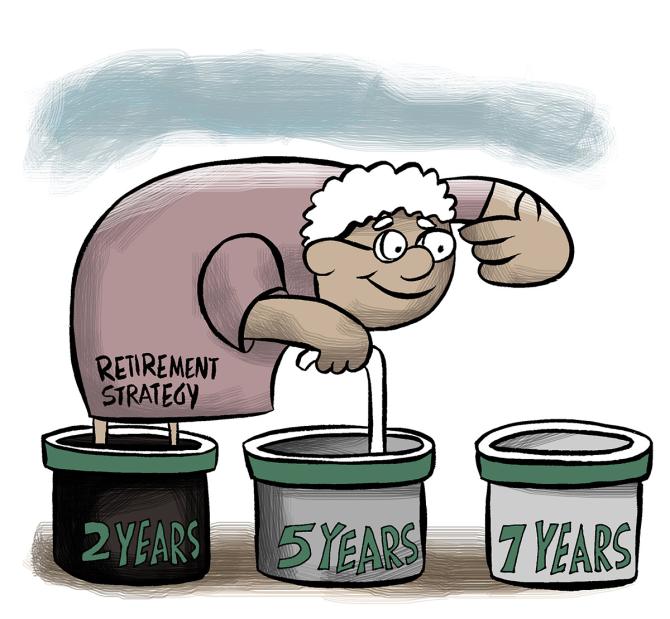Those who have crossed 50 must show the greatest urgency.
They need to achieve a corpus that can sustain them and their spouses for at least 25-30 years after retirement, advises Bindisha Sarang.

While everyone looks forward to a peaceful retirement, that goal may prove elusive for those who don't accumulate an adequate retirement corpus.
A recent study by Max Life Insurance, in partnership with Karvy Insights, covering 1,800 respondents across 28 cities, paints a dismal picture of Indians' retirement preparedness.
About 23 per cent said they have given no thought to retirement planning.
Nearly 80 per cent feel they should have begun investing earlier.
56 per cent believe their savings will get exhausted within 10 years of retirement.
And 45 per cent are banking on their children.
Starting late
Those who have crossed 50 must show the greatest urgency.
They need to achieve a corpus that can sustain them and their spouses for at least 25-30 years after retirement.
Says Mumbai-based certified financial planner Kiran Telang: "There is no easy way out for them. They must cut down their expenses drastically and invest more. Those above 50 are also at higher risk of losing their jobs. If that happens, and they have only a small corpus, it could be a double whammy."
Savings may not last a lifetime
Many people grossly underestimate the corpus they will need during retirement.
Retirement calculators available online can help you get an idea.
You may also use this rule of thumb.
Says M Barve, founder, MB Wealth Financial Solution: "Your retirement portfolio should be at least 50 times your yearly expenses. If you withdraw 4 per cent of it each year, this kitty will last for at least 30 years."
He suggests consulting a financial advisor who will be able to arrive at a more accurate estimate based on your needs.
Reliance on children
Around 45 per cent of the respondents said their children would take care of them in old age.
Telang, however, says, "Your children may have their own challenges related to their careers and finances."
Adds Mumbai-based investment and tax expert Balwant Jain: "Your adult children will have their own children, and they will become their first priority."
Another development that warrants attention relates to health insurance.
Says Telang: "Parents used to be fully covered by an adult child's office group health insurance policy. But nowadays either the size of the coverage has been reduced, or it comes with a high co-pay component."
Avoid toxic insurance products
People who have invested in traditional insurance-cum-investment plans that offer low rates of return should exit them.
Says Jain: "Surrender them and buy a term plan. Invest the balance money in equity mutual funds."
However, a term plan is a must. Buy a cover whose tenure lasts till 80 so that your spouse is financially protected.
Adequate health insurance is another must-have product.

Strategy in accumulation phase
Those beginning to save for retirement at 50-plus should not court excessive risk to compensate for their late start.
According to Shweta Rajani, senior vice president and head (mutual funds), Anand Rathi Wealth, "Strike a balance between the return you are trying to earn and the risk you take."
She suggests the following portfolio: 60 per cent in equity mutual funds, 15 per cent in National Pension System (NPS), 5 per cent in Sovereign Gold Bonds, and 20 per cent in debt mutual funds."
Another product investors can use is the National Pension System (NPS).
It has among the lowest fund management fees.
The stringent rules regarding withdrawal ensure that investors don't spend their retirement corpus on other needs.
It also provides tax-free rebalancing and an exclusive tax benefit.
Says Barve: "You can claim deduction on contribution of up to Rs 50,000 under Section 80CCD(1B) of the Income-Tax Act."
And while the requirement to invest minimum 40 per cent of the corpus in annuities limits flexibility, the Pension Fund Regulatory and Development Authority (PFRDA) may soon introduce the systematic withdrawal plan (SWP) option.
Strategy at withdrawal stage
After retirement, divide the accumulated corpus into three buckets.
Says Telang: "In the first bucket, keep the funds that you may require over the next two years. This money should be invested in completely safe assets."
The second bucket could have medium-term investments like medium-duration debt funds.
If you use target maturity funds, then shift the money from this bucket to the first whenever these funds mature.
The third bucket should have equity mutual funds, where you should have a horizon of at least seven years.
The bucketing strategy will help you take care of both your immediate needs and enable you to tackle inflation (via the equity component).
One product that can also be a part of your portfolio after retirement is immediate annuities.
Only an annuity can offer a guaranteed income for life.
In all other products, you run the reinvestment risk (if interest rates dip in the future, you will have to accept that).
Buying an immediate annuity without the return of purchase price option can get you a better rate of return. (The with-return of purchase price option, however, allows you to pass on the principal to your nominee.)
If you have moved into a lower tax bracket after retirement, then taxation of interest income at slab rate will hurt you less.
According to Rajani, "The biggest drawback of annuities is that inflation gradually erodes the value of the fixed amount you get from it."
According to her, a systematic withdrawal plan (SWP) from debt mutual funds is more tax effective. However, the risk here is that you may over withdraw.
Ideally, you should use a mix of strategies -- SWP from debt funds and annuities.
Government-backed products like Senior Citizens Savings Scheme (interest rate 7.4 per cent, taxable) and Pradhan Mantri Vaya Vandana Yojana (same rate, taxable) are other good options.
In the worst-case scenario, Jain suggests that house owners opt for reverse mortgage. Doing some gig work post-retirement will also help.
Feature Presentation: Aslam Hunani/Rediff.com










